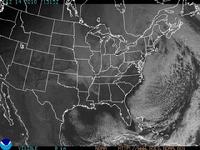|
Vincent Pica
Chief of Staff, First District, Southern Region (D1SR)
United States Coast Guard Auxiliary
|
Whither The Weather, Heather?
|
|
Clearly, we’ve seen some horrendous weather of late. With hundreds killed in the southeast of our country, it puts into perspective our complaints about heavy fog, drenching rain and a cold and damp Spring. But, like hurricanes vs the tails of hurricanes, (see “Hurricanes on Long Island”; see “Preparing Again for Hurricanes”; see “Hunkering Down on Long Island – 2010”), weather like we’ve been seeing is far more likely to affect us and thus we should understand the forces at play. This column is about that.
The Lake Effect
We’ve all heard of the “lake effect” where the Great Lakes dump so much snow on upstate New York and nearby states. Snow accumulations of 10’-12’ over the course of the winter in Buffalo are not unusual. The phenomenon occurs when cold air flows over the relatively warm lakes. The relative heat of the lakes leads to warming of the lowest levels of the atmosphere, which promotes rising air. When air rises in the atmosphere, it is cooled, and if enough upward motion (and thus enough cooling) results, then the air will reach its dew point and condensation will occur leading to cloud development. Eventually the clouds will produce precipitation. And, if you’ve been following the weather upstate (I was just up there for USCG business), flooding from unrelenting rain is rampant.
The Ocean Effect
Why doesn’t that happen here, at the seashore where all the same characteristics are at hand – warmer water, winds and cold air? In fact, it does. The Ocean Effect just doesn’t get as much media attention since nobody lives over the ocean, and there are no roads to get clogged by snow. Also, the temperature gradient isn’t as great since we don’t get as much of that Canadian cold air as they do upstate .
Since most of us aren’t boating during the winter months, it isn’t much if an issue. However, with the extremes of weather we’ve been seeing, we can see the ocean effect both in the Fall and in the Spring. And what doesn’t fall as snow falls as rain. And plenty of it as we’ve seen.
|
The accompanying satellite photo shows an excellent example of ocean effect conditions. Clear skies over the mainland and plenty of cloud cover over the ocean – and seashore communities. The basics are very similar to the lake effect scenario, thus it will occur when rather cold air flows over the warmer ocean waters. Once the air has been over the water long enough (i.e. a bit offshore), it warms and rises - and clouds will form. And, if the temperature difference between the air and the water is large enough, precipitation will develop from these clouds. This situation will frequently occur behind a cold front which has moved off shore.
|
 |
| click to enlarge - courtesy of NOAA |
|
|
Typically a cold front will be accompanied by showers, then clearing skies are likely after the front has passed and the colder and drier air mass moves in. Forecasts in coastal locations will indicate this progression of events, but offshore the situation may be different with clearing skies initially followed by the ocean effect conditions described above. And remember, all ye seaside residents, Montauk is 130 miles out at sea, relative to New York City. These long shorelines of the northeast can create “at sea” weather conditions, right here on land.
So if you happen to be operating over the Atlantic waters this Spring (or Fall) when a particularly cold air mass follows a cold front, be aware that despite forecasts of clearing, windy and colder conditions, offshore it is very likely that considerable clouds will be experienced, with the real potential for serious rain, or snow, at times.
|
BTW, if you are interested in being part of USCG Forces, email me at JoinUSCGAux@aol.com or go direct to the D1SR Human Resources department, who are in charge of new members matters, at DSO-HR and we will help you “get in this thing…”
|
| <-- click there to tweet, post or otherwise distribute to the 'net
Have something to add, ask or pass along? Pls do so below! I promise a response.
|
|